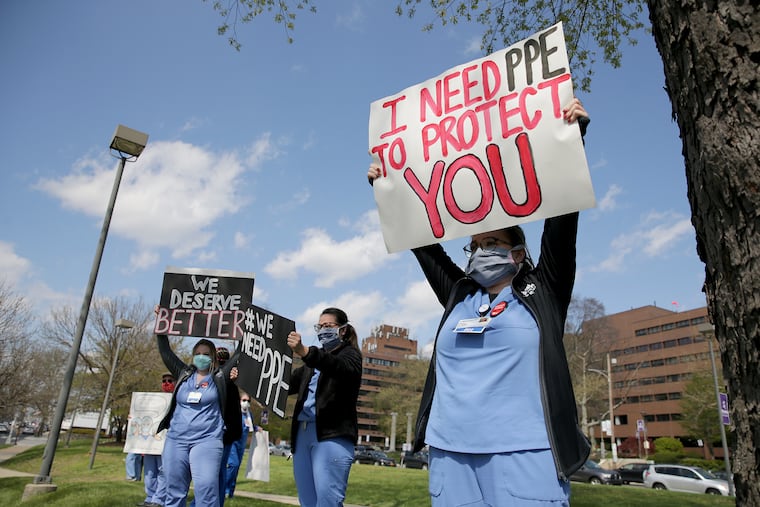‘To protect against the next wave,’ N.J. stockpiles equipment; officials ask people to speak with contact tracers
Villanova University warned students that partying could shut down campus all year, and Pennsylvania saw promising rates in the percentage of people testing positive for the virus.

Preparing for the possibility of a surge in coronavirus cases later this year, New Jersey is stockpiling masks, gowns, ventilators, and other personal protective equipment, along with the antiviral drug remdesivir, hoping to avoid the severe equipment shortages it experienced in March and April.
“Building this stockpile is how we’ve been working to protect against the next wave, please God, or the next pandemic even as we continue to fight this one,” Gov. Phil Murphy said Friday.
Garden State officials aren’t the only ones looking ahead. Friday saw more warnings and pleas aimed at students, with Gloucester County high schoolers cautioned after the virus spread at a party and Villanova University becoming the latest college to threaten to shut down in-person classes if students don’t treat the pandemic seriously.
Despite that, high school sports in Pennsylvania were given the go-ahead by the state interscholastic athletic association, which voted to proceed with fall sports in spite of a “strong recommendation” from Gov. Tom Wolf’s administration to postpone youth sports until January.
Whether to play will be decided by individual school districts. Some in the region and state have already postponed fall sports; for others, the decision by the Pennsylvania Interscholastic Athletic Association offers a green light to move ahead with their seasons.
» READ MORE: PIAA gives the green light to fall high school sports in Pennsylvania
Amid viral images of mask-less partygoers crowding campuses nationwide as fall semesters begin, Villanova University’s president issued a brief warning to students just hours after his counterpart at Pennsylvania State University sent out a similar message in State College.
“If your actions force us to close, it’s not just for this semester. It will be for the rest of the year,” Villanova’s president, the Rev. Peter Donohue, told students. “This will mean, in all likelihood, there will be no commencement on campus next spring, no opportunity to be with your friends, and no more memories made on campus this academic year.”
Villanova came under scrutiny for a student gathering last week; during the school’s first week back, Donohue said multiple students had been “issued serious disciplinary consequences, including being sent home,” for not following safety rules. There were no known coronavirus cases on campus as of late Thursday, according to the university, which did not provide more details about the disciplinary actions.
» READ MORE: Penn State students party outside freshman dorms, flout coronavirus safety rules during move-in week
The warnings came as the small spikes in case numbers the region saw in July appeared to have moderated.
Pennsylvania’s daily average of new coronavirus cases over the last seven days was 669 on Friday — a decrease from an 815 last week, according to an Inquirer analysis. And the state’s positive test rate was about 3% over the last seven days, considered a good sign.
The state reported 693 new cases and 20 deaths on Friday. Philadelphia, which officials said Thursday was making progress in decreasing the spread of the virus, reported 117 new confirmed cases Friday.
The city also said that municipal trash collection — which has been plagued by delays during the pandemic — is running up to two days behind and recycling collection multiple days behind. Residents should still put their trash out one day behind their regularly scheduled day.
New Jersey added 313 cases and 13 deaths on Friday. The state extended its moratorium on public water, gas, and electric utility shutoffs until Oct. 15.
The state has ordered 500 ventilators to add to its stockpile of 1,447. An additional 600 are already in hospitals.
Murphy said officials were working on a timeline for allowing New Jersey’s restaurants to resume indoor dining but that he remains concerned about reports from other states about the spread of the virus through indoor activities.
He made an example Friday out of one Ocean County diner that offered indoor dining in defiance of his orders and has been repeatedly cited for public health violations. On Friday, authorities changed the locks on the doors at the Lakeside Diner in Lacey Township, and Murphy told reporters that “you’re damn right we’re going to enforce” the state’s orders.
“We’re desperately trying to get to a better public health reality,” he said, “and save as many lives as we can.”
Impeding that effort, he said, was the increasing number of people who refuse to talk to contact tracers — more than half of the people reached by the state’s 1,612 tracers have declined to cooperate. Philadelphia health officials have cited similar problems, recently asking people to answer contact tracing calls.
Murphy said the trend was “highly disturbing” and repeated that the phone calls are not a “witch hunt” to prosecute people for illegal behavior such as underage drinking.
“Contact tracers are calling with lifesaving information that will keep you and your loved ones, and our communities, safe and healthy,” said Health Commissioner Judith Persichilli.
» READ MORE: What is contact tracing, and why is it important?
Staff writers Phil Anastasia, Erin McCarthy, Rob Tornoe, and Laura McCrystal contributed to this article.